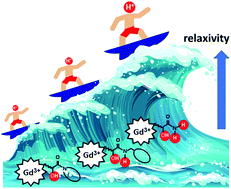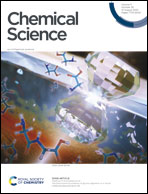Acid-catalyzed proton exchange as a novel approach for relaxivity enhancement in Gd-HPDO3A-like complexes†
Abstract
A current challenge in medical diagnostics is how to obtain high MRI relaxation enhancement using GdIII-based contrast agents (CAs) containing the minimum concentration of GdIII ions. We report that in GdHPDO3A-like complexes a primary amide group located in close proximity to the coordinated hydroxyl group can provide a strong relaxivity enhancement at slightly acidic pH. A maximum relaxivity of r1 = 9.8 mM−1 s−1 (20 MHz, 298 K) at acidic pH was achieved, which is more than double that of clinically approved MRI contrast agents under identical conditions. This effect was found to strongly depend on the number of amide protons, i.e. it decreases with a secondary amide group and almost completely vanishes with a tertiary amide. This relaxivity enhancement is attributed to an acid-catalyzed proton exchange process between the metal-coordinated OH group, the amide protons and second sphere water molecules. The mechanism and kinetics of the corresponding H+ assisted exchange process are discussed in detail and a novel simultaneous double-site proton exchange mechanism is proposed. Furthermore, 1H and 17O NMR relaxometry, Chemical Exchange Saturation Transfer (CEST) on the corresponding EuIII complexes, and thermodynamic and kinetic studies are reported. These highlight the optimal physico-chemical properties required to achieve high relaxivity with this series of GdIII-complexes. Thus, proton exchange provides an important opportunity to enhance the relaxivity of contrast agents, providing that labile protons close to the paramagnetic center can contribute.



 Please wait while we load your content...
Please wait while we load your content...